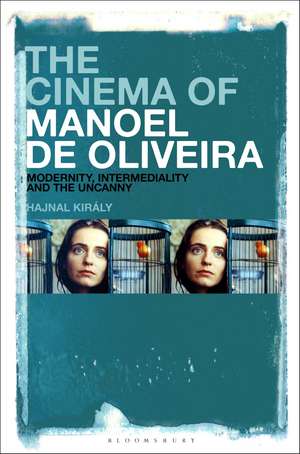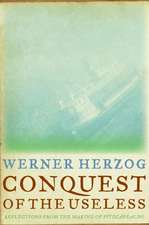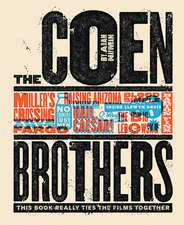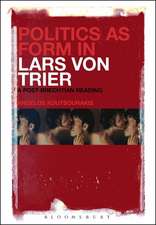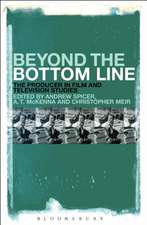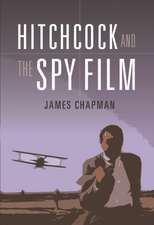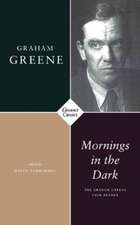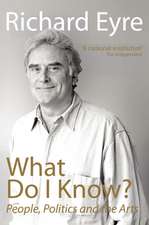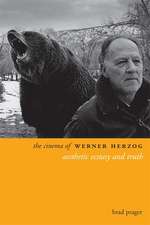The Cinema of Manoel de Oliveira: Modernity, Intermediality and the Uncanny
Autor Hajnal Királyen Limba Engleză Paperback – 27 dec 2023
| Toate formatele și edițiile | Preț | Express |
|---|---|---|
| Paperback (1) | 189.80 lei 6-8 săpt. | |
| Bloomsbury Publishing – 27 dec 2023 | 189.80 lei 6-8 săpt. | |
| Hardback (1) | 508.87 lei 6-8 săpt. | |
| Bloomsbury Publishing – 15 iun 2022 | 508.87 lei 6-8 săpt. |
Preț: 189.80 lei
Preț vechi: 248.54 lei
-24% Nou
Puncte Express: 285
Preț estimativ în valută:
36.32€ • 38.02$ • 30.05£
36.32€ • 38.02$ • 30.05£
Carte tipărită la comandă
Livrare economică 05-19 aprilie
Preluare comenzi: 021 569.72.76
Specificații
ISBN-13: 9781501378621
ISBN-10: 1501378627
Pagini: 192
Ilustrații: 65 bw illus
Dimensiuni: 152 x 229 x 25 mm
Greutate: 0.26 kg
Editura: Bloomsbury Publishing
Colecția Bloomsbury Academic
Locul publicării:New York, United States
ISBN-10: 1501378627
Pagini: 192
Ilustrații: 65 bw illus
Dimensiuni: 152 x 229 x 25 mm
Greutate: 0.26 kg
Editura: Bloomsbury Publishing
Colecția Bloomsbury Academic
Locul publicării:New York, United States
Caracteristici
Offers fresh readings of some of Oliveira's key works such as The Cannibals (1988) and The Uncertainty Principle (2002)
Notă biografică
Hajnal Király is a Senior Researcher at Sapientia Hungarian University of Transylvania, Romania. She is the author of Between Book and Film: Beyond the Fidelity Principle (2010), and has contributed to many edited collections and scholarly articles.
Cuprins
AcknowledgmentsIntroductionI. The Beautiful Automaton1. Cinema and/ as the Myth of Modernity 2. Towards an Oliveirian Aesthetics of Stillness3. The Trope of the DollII. Camões and Don Quixote4. The Cultural Philosophy of Oliveira5. Profanations6. Cultural MimicriIII. Doomed Loves7. Disturbing Adaptations8. Letters on the Screen9. Sounding LettersCoda: A Melancholic Cinema?Index
Recenzii
The Cinema of Manoel de Oliveira establishes significant connections between cinema and other art forms and explores, in a captivating way, twentieth-century Portuguese, European and world history. Dismissing a chronological approach, the book provides an engaging analysis of over 30 different titles, including the latest films by the Portuguese filmmaker. Hugely comprehensive and well researched, this is a fresh reading of Oliveira's work, which proves that, more than 110 years after his birth, he is still an important reference in the global history of film.
Hajnal Király's in-depth analysis of Manoel de Oliveira's oeuvre from a psychoanalytic prism is both theoretically sophisticated and thorough in its interpretation of a variety of films. Using the notion of the uncanny as a guiding thread, the author offers a unified vision of Oliveira's filmography that is a must-read for fans of the renowned Portuguese director.
The Cinema of Manoel de Oliveira: Modernity, Intermediality and the Uncanny provides powerful insights into the intriguing body of work by Manoel de Oliveira, a director with an idiosyncratic style and a distinctive outlook. Oliveira's unwavering dedication to cinema as an art form is virtually unparalleled, and finds in Hajnal Király an incisive, meticulous interlocutor. Enthusiasts and scholars alike will find plenty of food for thought in Király's meditations on key notions and concepts that help ?illuminate Oliveira's cinematic language. Király reveals how these reputedly "difficult" films, while enigmatic, are always movingly crafted and intent on rewarding an attentive spectator.
Hajnal Király's in-depth analysis of Manoel de Oliveira's oeuvre from a psychoanalytic prism is both theoretically sophisticated and thorough in its interpretation of a variety of films. Using the notion of the uncanny as a guiding thread, the author offers a unified vision of Oliveira's filmography that is a must-read for fans of the renowned Portuguese director.
The Cinema of Manoel de Oliveira: Modernity, Intermediality and the Uncanny provides powerful insights into the intriguing body of work by Manoel de Oliveira, a director with an idiosyncratic style and a distinctive outlook. Oliveira's unwavering dedication to cinema as an art form is virtually unparalleled, and finds in Hajnal Király an incisive, meticulous interlocutor. Enthusiasts and scholars alike will find plenty of food for thought in Király's meditations on key notions and concepts that help ?illuminate Oliveira's cinematic language. Király reveals how these reputedly "difficult" films, while enigmatic, are always movingly crafted and intent on rewarding an attentive spectator.
